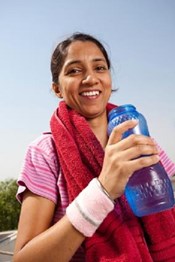Ever notice how lifeless a house plant looks when you forget to water it? Just a little water and it seems to perk back up. Water is just as essential for our bodies because it is in every cell, tissue, and organ in your body. That's why getting enough water every day is important for your health.
When you're dehydrated, your body doesn't have enough fluid to work properly. An average person on an average day needs about 3 quarts of water. But if you're out in the hot sun, you'll need a lot more than that. Most healthy bodies are very good at regulating water. Elderly people, young children and some special cases - like people taking certain medications - need to be a little more careful.
Signs of dehydration in adults include
- Being thirsty
- Urinating less often than usual
- Dark-colored urine
- Dry skin
- Feeling tired
- Dizziness and fainting
Signs of dehydration in babies and young children include a dry mouth and tongue, crying without tears, no wet diapers for 3 hours or more, a high fever and being unusually sleepy or drowsy.
If you think you're dehydrated, drink small amounts of water over a period of time. Taking too much all at once can overload your stomach and make you throw up. For people exercising in the heat and losing a lot of minerals in sweat, sports drinks can be helpful. Avoid any drinks that have caffeine.
Where do I get the water I need?
Most of your water needs are met through the water and beverages you drink.
You can get some fluid through the foods you eat. For example, broth soups and other foods that are 85% to 95% water such as celery, tomatoes, oranges, and melons.
What does water do in my body?
Water helps your body with the following:
- Keeps its temperature normal.
- Lubricates and cushions your joints.
- Protects your spinal cord and other sensitive tissues.
- Gets rid of wastes through urination, perspiration, and bowel movements.
Why do I need to drink enough water each day?
You need water to replace what your body loses through normal everyday functions. Of course, you lose water when you go to the bathroom or sweat, but you even lose small amounts of water when you exhale. You need to replace this lost water to prevent dehydration.
Your body also needs more water when you are—
- In hot climates.
- More physically active.
- Running a fever.
- Having diarrhea or vomiting.
To help you stay hydrated during prolonged physical activity or when it is hot outside:
- Drink fluid while doing the activity.
- Drink several glasses of water or other fluid after the physical activity is completed.
Also, when you are participating in vigorous physical activity, it's important to drink before you even feel thirsty. Thirst is a signal that your body is on the way to dehydration.







